


 |
 |
 |
|
|
||
| Cherokee
County Families
|
|---|
 |
Memories and Stories |  |
| Richard D. Cleaves From My Past: Cherokee, Iowa to New York City 1909 to 1933 |
| 11. Summer In the summertime, of course, it was time to swim and fish. Summers in Iowa are very hot but dry. A long heat spell would be broken by a violent thunderstorm with its tremendous display of lightening and thunderclaps that shook the ground before rumbling off into the distance. Sometimes we fished in the Little Sioux River where we caught both catfish and carp. The carp we didn’t eat because the water was polluted. We swam naked and fished with bamboo poles in Mill Creek. Mill Creek
Later they cut a gravel pit. When they stopped mining the gravel, the lake filled up from streams and it became the swimming hole. It had a diving board of course. I became a lifeguard for a couple of summers. There were three of us as lifeguards and I was the only one who never had to save anybody because I was not a very good swimmer. Gravel Pit Swimming Hole (today, Larson Lake, 8 miles from Cherokee) 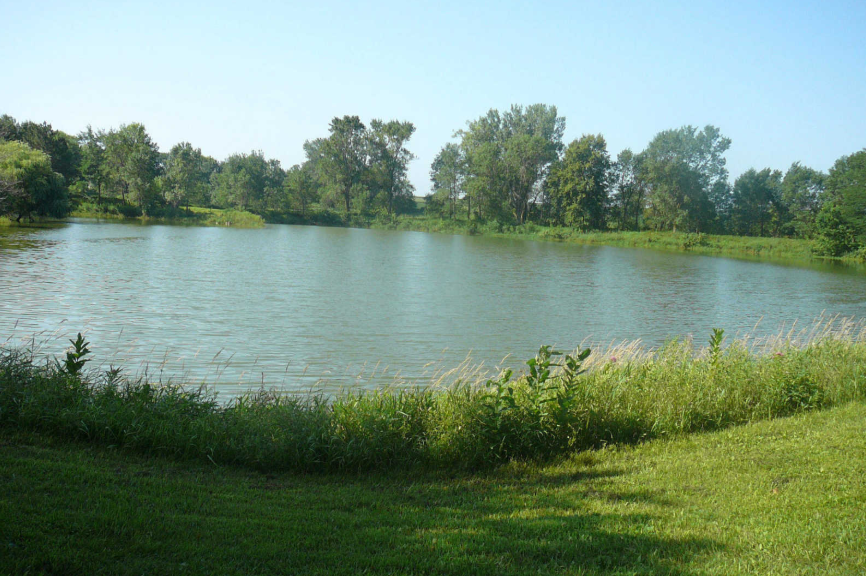 Little Sioux River 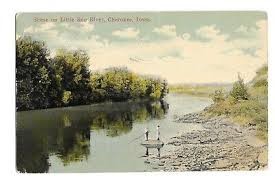 Another non-edible fish that we caught were garfish. Gars are long skinny fish with hard scales and a horny snout so filled with teeth that it is impossible to set a hook. They used to lie in schools in shallow water and most people who went after them for sport used spears. We had a different method. We would tie a slipknot in the end of a buggy whip and work it into the gar’s mouth. A jerk and we usually had our prey. One day my brother and I and a friend lassoed 17 garfish for a record. We used a somewhat similar method to snare gophers that infested the golf course. We would frighten the gopher into his hole and put a snare with a slipknot about two inches deep in the hole. We’d lie down on the grass a few feet away holding the end of the string. In a few minutes a tip of the gopher’s nose would stick up so it could just barely be seen, which was the cue to pull the string. It never failed. If the county had put a bounty of gophers, we could have made more money than with a lemonade stand. At Mill Creek we used to catch bullhead, catfish, and something we called white bass. I don't know what kind of fish it was but it was a good eating fish and that was from a clear stream, so we didn't have to worry about contamination. It was quite shallow and every once in a while, there'd be a deep hole where the fish were. We liked fishing there in the summertime. 12. Skookum and Squirrels We hated to see the end of summer -- but only because it meant having to go back to school. As a season of the year, fall had as many joyful opportunities for young boys as did summer. For one thing, there was hunting. We had a dog named Skookum, a dog we would take into the woods. Skooks was a Spitz-Shepherd, named after Skookum Chuck in Rolf in the Woods. Skookum Spitz Half Breed
Skooks was a smart dog. We went after squirrels with Skooks. As soon as the leaves had fallen, we would take slingshots and Skooks and go out into the wooded area of Uncle Guy’s pasture to hunt squirrels. Our squirrel-hunting method was simple and successful. Skooks would roam the woods and his frantic barking would let us know he had located a squirrel. We had slingshots and what we wanted to do was to get the squirrel running. We would pound on the tree trunk with heavy limbs. We'd shoot slingshots to get the squirrel to climb a tree and we’d shoot the slingshot to get the squirrel to run from tree to tree, from branch to branch. Finally, he’d reach the end of the branches and would jump to the ground. Then Skooks would get him and swing him around up in the air and kill him. One day we got 11 squirrels just using Skooks without any guns. They are very hard to skin...the skin is so tough. We would take them back home. We would skin and Mother would fry them. They tasted very much like chicken or rabbit...very good to eat. Skinning Squirrel
13. Skooks on the Golf Course Skooks was a remarkable dog in many ways. Skooks loved the golf course and was happiest when accompanying my Dad on a round of golf. Dad taught him to shag golf balls. Dad would go out on the first tee – there was no driving range --- and Dad would throw out a ball. Then Skooks would run up to the ball and grab it in his mouth and come running back with it. He would help to look for lost balls and more than occasionally would find one, although it was usually not the one that he was supposed to be looking for. Dad had taught Skooks to pick his ball out of the cup and carry it to the next tee. One day Dad was playing with Harry Korns who ran the poolhall in town. He had the reputation of being very tight with his money. Harry was very deaf but refused to wear any kind of a hearing aid because he said it cost too much. One day Dad and Harry were playing golf and so Dad on the first hole had Skooks bring the ball back up to the tee, and then on the next hole he had Skooks do the same thing. Harry was quite impressed with Skooks’ performance, and after the foursome had holed out on the third hole he said, “Doc, that’s the smartest goddam dog I ever saw! See if Skooks will carry my ball up to the next tee.” “Sure,” said Dad. “Throw him your ball. Skooks, carry the ball to the next tee.” To get to the fourth tee the golfers had to cross a plank footbridge over a deep pool in the creek that meandered through the course. Skooks was trotting happily ahead and when he was halfway across the bridge, Dad said under his breath, “Drop it!” Skooks just dropped the ball into a great big pond below. Harry looked down into the pool where his ball had already sunk out of sight. Harry was so mad that he said, “That godarned dumb dog! That’s the dumbest dog I ever saw!” In the fall, there were jackrabbits on the golf course, and Skooks would jump up and go chasing after them. The jackrabbits are fast, almost faster than Skooks, who was just a little guy. One day Skooks jumped a jack rabbit and got him to take off across the 8th hole up to the State Hospital grounds. They had a hog fence there and the jackrabbit stuck his head through a couple times and found he couldn’t get through. He turned around and came tearing back from where he had come from, the direction toward from where Skooks was pursuing him. Skooks took one look at this great big jackrabbit charging toward him. He put on the brakes, turned around and went the other way. You looked out and saw the jackrabbit chasing little Skooks. Cherokee State Mental Hospital 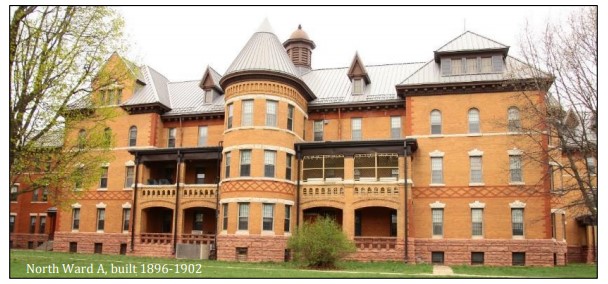 14. Fall Geese In our early boyhood there was still a lot of game around Cherokee. Rabbits and squirrels abounded and were fairly easy game. Early in the fall, there were still geese, ducks, and pheasants around, and prairie chickens. Prairie chickens are a form of grouse. They are very dumb, and while not in the countless numbers of fifty years earlier, they were there in the thousands. Once I saw a flock so huge that it was weighing down and breaking the branches of a tree where all were trying to roost at one time. You could walk up to them slowly and hit a couple with a club before they all few away. Prairie chickens were never very smart, which is why there aren’t many left. During the fall migration we thrilled at the sight of hundreds of flocks and thousands of ducks and geese riding a north wind on their way to the Gulf and to Mexico. One night a flock of geese became confused by the Cherokee street lights and flew around the town for hours, honking their distress. Later when I was in high school, we were at our fall football practice in the afternoon and great flights of geese would fly by. The whole team would stop and watch them flying south. There was good duck hunting along Mill Creek and the Little Sioux River, and sometimes the Canadian geese and some swans would light in a cornfield to feed, but we could never take advantage of it because we didn’t have a shotgun. Pheasants were there. I never had a shotgun but I did have a 22 rifle. One Saturday I was walking on the railroad tracks which at that point was elevated -- down below was a sort of a valley. I had a single shot 22. I looked down and there was a pheasant, walking along very sedately. I took aim and fired and hit him perfectly. He just dropped down. I was quite satisfied. I ran down the culvert and got to the pheasant. He looked up at me, got up and flew away. I didn’t realize he was wounded but still had the strength to fly away. What I should have done was, a few feet away, reload the gun and shoot him again when I got close to him. But I really thought I had got him.
15. Trapping Civets In the fall also, one year when I was in high school, I decided to trap. There were these wonderful magazines that came out of St. Louis that said, “We pay highest prices for furs.” They sold traps and they talked about paying some huge sum like $12 for a skin of a mink and paying $0.75 for skunks and civet cats and muskrats and things like that.
So, I decided to go into the trapping business. I had to walk my trapline every morning, or otherwise whatever I trapped would gnaw off its leg and escape. This meant on school mornings I would get up about 4:30, dress quietly and walk my line with a flashlight. Getting to the woods and checking each trap meant a walk of about two miles each way. The only thing I could trap was civet cats which are a form of skunk. Of course, it’s quite difficult because they are still alive in the trap and you had to kill them without being sprayed. I took Skooks with me and Skooks made a mistake once of getting out ahead and, seeing the civet cat in the trap, went charging after him. Of course, he got squirted and was just covered with civet cat oil. Civet Cat Alive and Skinned
I used to hang my skins the pelts on stretchers in the garage. Dad was upset about that because they still stank, and Dad's garage was all stunk up. People were starting to remark that my father’s car was getting pretty musty, but I was so enthusiastic about my new career that my parents suffered along. One morning I went out and set a trap part way up a slight rise. Sure enough, I was quite lucky and there was a great big civet cat in the trap. I stood at the bottom of this little rise and tried to figure out how I was going to get out to him and kill him without getting squirted. I’d forgotten about the fact that the civet cat was higher than I was and he had a perfect trajectory. He just turned around and lifted his tail and got squirt all over me. I had to go to school and I didn't have time to go home and change so I went to school. Of course, they kicked me out. I had read some place that if you burn pepper in the same room with clothes that have been stunk up with skunk oil, that takes the smell out. The only place where I could do this was in Dad’s office. He wasn’t there at noon. I knew that there was a place that was partitioned off and there was a back room. I took my clothes down there, I laid them out, started the pepper going up in smoke, and left the office. What I neglected to know was that it wasn't a full partition from the front office; it was just a half partition. When I decided that it'd gone on long enough and probably the clothes are all right, I went back and here was a patient in the outer office with a handkerchief to his nose and he was sneezing and coughing. I went back in the back and about that time Dad came in the door and he was furious. I had to sell the traps and the remaining skins, and that ended my trapping career. 16. Our Cabin One year, Prent and I decided to make our own cabin out in Uncle Guy’s pasture. We went up the hill, dug into the hill, excavated, and then we got some lumber, put up the four frames, posts, tacked on the siding, made a door and made a roof so it wouldn't leak. Then we went to the junkyard and found an old wood burning stove and put that in for heat. We had a very nice camp and of course I had my traps in there. We went out there a few times and we may have had a bunk for two people to go out there to sleep. We were really proud of our camp. Well, there were some other boys in town that had a camp maybe a couple of miles away, much fancier than ours and bigger. Apparently, they had put the camp on a property and whoever owned it didn’t want the camp there and told the boys to get it off. Well, they didn’t do it so apparently the owner set fire to it. The boys knew about our camp and they got the idea that we were the ones who had burned their camp. So, we went up there one day and it wasn’t there. And that was the end of our camp. 17. Animals in Guy Gillette’s Pasture Years later when I went back to Guy’s pasture -- and saw that it was not the big wide spread of forest that we always thought it was -- it was a very small place. But we used to see quite a bit of game out there. I’d seen a fox, of course rabbits and squirrels, skunks and civet cats. One year we were out there we saw a snowy owl, which was very rare even in those days. As a matter of fact, it was a pair of snowy owls, pure white. I remember there was a black ring around their eyes. They were big birds. We told Uncle Guy about it, and he was quite amazed that we had seen them. Uncle Guy’s pasture was a great place to go. Snowy Owl in Iowa  I have one more wild animal story about Uncle Guy’s pasture. We used to go out with a 22 and see a squirrel’s nest up in the trees. We didn’t know if there was a squirrel up there or not, but when we saw a hole in the tree, very often we would just shoot into it. I got out there one day. I shot into a hole, and out came a possum and fell to the ground. I went over close to him and they're supposed to be passive animals. But this thing took a lung and gave me a terrific bite on my boot. It broke the leather but fortunately didn't break the skin under the boot. We didn’t eat him…they’re not supposed to be good to eat so we didn’t eat him. Attacking Possum  18. Red Cross Auction My father Doc Cleaves was extremely intelligent, a crackerjack surgeon, but had many strange ideas. For example, when World War I broke out, he was head of the Cherokee Hospital. Dad decided to leave his practice and enlist. First, he went to training camp, and I think that Guy Gillette was in the same camp with him. Then he was taken to Rush Medical in Chicago to learn plastic surgery because so many of the boys of course were wounded and they had to have their faces, arms or legs rebuilt. Rush Medical College, Daniel A. Jones Building, 1917 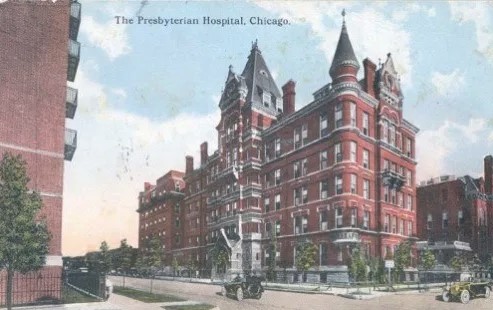 Then when Dad went to France it was decided that they would sell the house in Cherokee and we would move to Chicago to be near my aunts Irene and Ellen Cleaves. Everything was accomplished and we were to leave I believe on a Tuesday. On the Saturday before was a Red Cross auction sale; a charity sale to support the Red Cross in the war. Mother gave us – both Prent and me -- each $5 to go down and buy something at the Red Cross auction. Jane Delaplane Cleaves with older Prentiss and younger Richard
When we had completed our purchases, I had $0.50 left. Knowing that this was a charity affair, I went up on the platform to one of the auctioneers and said “I have $0.50 left and I want to give it to the Red Cross.” One of the other fellows on the platform recognized me and he grabbed me and put me up high in the air. Then he announced to the crowd that here was a little boy (I was then I guess about nine years old) …a little boy whose father is dying in France for his country and he has only $0.50 and he's giving it to the Red Cross. Of course, I started to cry because I didn’t like all the attention. The auctioneer said, “Give me that $0.50 and I'll auction it off.” He auctioned it off and a local banker bought it for $50. Then he bought me a 50 cent War Savings stamp.
We left the auction to come home and Mother was busy packing of course getting ready for the next Wednesday. She looked down the street and here are two small boys being dragged along by this huge Airedale dog fully grown and carrying a box in which were the three bantam chickens. She was beside herself and didn’t know what to do. She said, “Well, let’s just think about it.” That night we took the dog and the bantam chickens down to the basement. The next morning, we went down there and found that the dog had killed the chickens, which took care of that. On Monday we let the dog out and the Marshall came along. The dog didn't have a tag, so he shot the Airedale. That settled that and we could go to Chicago “in good conscience.” 19. Chicago and Francis Parker School In Chicago, we lived only about a block-and-a-half from Irene and Ellen who were on North Troy Street.  We were in an apartment on Kedzie Street and Lawrence. [Editor’s note: It was a 5-minute walk from Jane, Prent and Dick’s home to 4926 North Troy Street.] 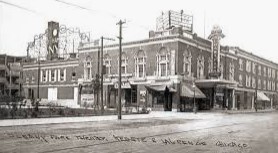 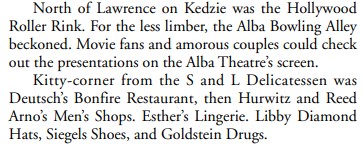 That was when Prent and I went to Francis Parker School for the first time. I was in 5th grade and Prent was in the 6th grade, I believe. [Editor’s note: The boys’ aunt Irene Cleaves was a teacher at Francis Parker School.]
Francis W. Parker School, Chicago, Illinois, 330 W Webster Ave, half block from N. Clark Street  Irene Cleaves outside Francis Parker School 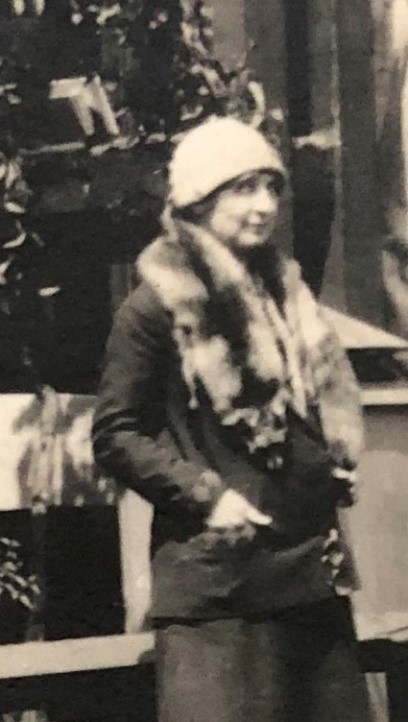 20. Dr. Prentiss Cleaves and WWI We stayed there until Dad came back from the war. We remember we had a wire from him after he landed in New York saying that he had finally been able to buy the Brooklyn Bridge -- and he was on his way home. Dr. Prentiss Bowden Cleaves (Click to enlarge photo) During the war, Dad was in a field hospital. He said that one of the saddest things that happened was after the Armistice. The word that the official Armistice was signed didn't get down to all of the troops in the field and the trenches. He had to operate on many of our boys who were wounded after the Armistice. Field Hospitals, France, World War One
Before he went over to France, Dad went over to the nearby convent and took French lessons. He was the only one in his immediate group that could speak any French at all. One day he told us that he and another fellow were walking over to a French town near the hospital and they came to a bridge which was being guarded. On top of all the big caissons that held the bridge up were manhole covers. All these covers on the bridge were off their holes. He wondered why these manhole covers were on the bridge. So, Dad went up to one of the guards and said in French, “Why are all the tops off?” The guard told him but Dad didn't understand and so he asked him again, and still he didn't understand. All the way down to the next town and on the way back, Dad was trying to put together the sounds that he had heard to try to figure out what the guard had said. When he came back, there were replacement guards on the bridge. So he asked again, “Why are the manhole covers on the bridge?” The guard told him, Dad didn’t understand, so he asked him again. To his dying day, Dad never could figure out why those manhole covers were on the bridge. When Dad came home, as I said, Dad had been Head of the hospital before he left. [Editor’s note: Alternatively. President of the Cherokee County State Medical Society] Now Doc Jones had taken over the hospital. Some of the other doctors, like Doc Hall who was not a surgeon and some of the others came to Dad and said, look Doc, we would like to start working with you again, but Doc Jones has been splitting fees with us. Dad said, “No, I won’t split fees.” Dad had a very high sense of ethics and he just wouldn't prostitute himself even though these doctors were his good friends.
|
Return to Table of Contents Return to Families Index Return to Home Page